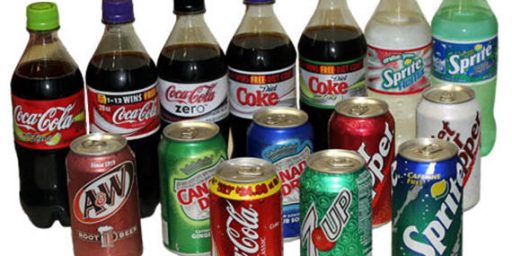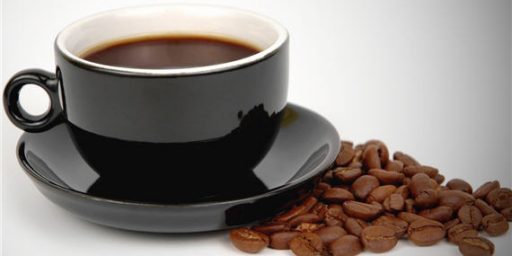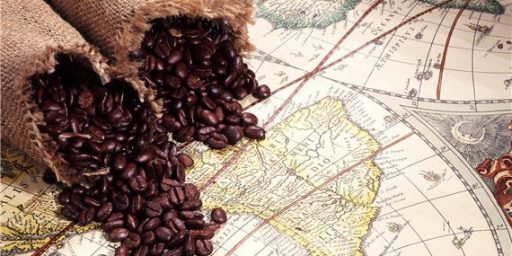Citrus Sodas Have More Caffeine than Cola
Citrus sodas like Mountain Dew and Vault have more caffeine than colas, according to a study by researchers at Auburn University.
The study by [Leonard] Bell and co-author Ken-Hong Chou found caffeine content in 12-ounce sodas ranged from 4.9 milligrams for a store brand of cola to 74 milligrams in Vault Zero, a citrus drink.
[…]
The Coca-Cola Co., based in Atlanta, and Purchase, N.Y.-based PepsiCo Inc. said they are phasing in new labels that include caffeine content. Most national brands also provide lists of the amount of caffeine in their products on their Web sites. “It’s really in our best interest and that of our consumers to provide that info,” said Diana Garza, a Coca-Cola spokeswoman.
While caffeine occurs naturally in some products, like coffee and tea, it’s an additive in soft drinks. It is commonly sought out for its stimulatory effect, and beverage companies say the slightly bitter substance is also an element in their flavor formulas. “The addition of caffeine in a beverage is largely as a flavoring,” Garza said.
Bell and Chou say the buzz caused by caffeine is its main draw. They said previous research showed that only 8 percent of adults were able to differentiate between the taste of caffeinated and caffeine-free colas.
Their study analyzed the caffeine contents of 56 national brand and 75 store brand carbonated drinks. It was published in the August issue of the Journal of Food Science. Caffeine content of well-known national brands include: Coca-Cola (33.9 milligrams), Diet Pepsi (36.7 milligrams), Pepsi (38.9 milligrams), Dr Pepper (42.6 milligrams), Diet Dr Pepper (44.1 milligrams), Diet Coke (46.3 milligrams), Mountain Dew (54.8 milligrams) and Diet Mountain Dew (55.2 milligrams).
By comparison, according to the American Beverage Association Web site, a 12-ounce cup of coffee has between 156 and 288 milligrams of caffeine, and the same amount of tea has 30-135 milligrams.
Frankly, I thought everyone knew this. Indeed, Mountain Dew was generally the most popular vending machine soda during my undergraduate days and my time in the military, lo those many years ago, precisely because it was reputed to have the most caffeine.
Of course, coffee is the much better choice for those looking for a mild stimulant, but it’s an acquired taste and tends not to be popular with teenagers.





So it was an Auburn study – but who actually funded it? Was it a Government grant or Auburn’s own money to study the obvious?
Mountain Dew is citrus? I always thought it was fermented evil.
Coffee puts the system under the strain of metabolizing a deadly acid-forming drug, depositing its insoluble cellulose, which cements the wall of the liver, causing this vital organ to swell to twice its proper size. In addition, coffee is heavily sprayed. (Ninety-two pesticides are applied to its leaves.) Diuretic properties of caffeine cause potassium and other minerals to be flushed from the body.
Advertising spam in violation of site policies deleted.
This is news? I recall hearing this as part of a stand-up comedy routine in the early ’90’s. The comic then noted caffiene’s tendency to (ahem) increase one’s excretions, and said it gave new meaning to Mountain Dew’s advertising slogan of the time, “Give Me a Mountain”.
Mt. Dew is something I turn to when I realize that everything I’ve drunk that day has been brown.
Citrus sodas like Mountain Dew and Vault have more caffeine than colas\
Which as far as Mountain Dew, at least, was known in the 70’s when I was going to college. Why was there a study on this?
Jackie,
Coffee generally has a pH in the neighborhood of 5, about the same as vinegar. For reference tomato juice has a pH of about 4 and lemon juice has a pH of about 2.
Cellulose, aka soluble fiber, is present in every plant. If you are truly worried about negative health effects of cellulose don’t eat any vegetables, especially not raw vegetables, they are loaded with it.
Re: pesticides
Coffee is the roasted (at about 400oC) bean of the coffee plant. The first step in processing is a long soak in water to soften the thick skin that surrounds the beans to allow it to be more easily removed and discarded. After all this it is ground and soaked in near boiling water. By the time all of this is done there will not be any detectable pesticides, herbicides, or fungicides. You face a much greater risk (though still small) from the fruits and vegetables at your local farmers’ market.